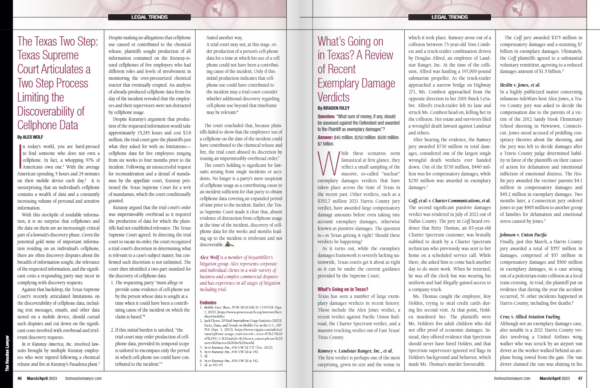With a deep understanding of your business alongside clear and honest communication, we help clients face challenges fearlessly.
Contact us today to learn more about our services and how we can help drive solutions.
The State of the "Inevitable Disclosure" Doctrine in Texas
February 21, 2020
Can former employees who are not subject to non-competes still be precluded from working for competitors?
The answer to this question hinges in large part on the viability of the “inevitable disclosure” doctrine, a doctrine that is the subject of much debate in Texas and has yet to be addressed by the Texas Supreme Court. Having been on both sides of the issue, I have witnessed firsthand how central it can be to employment disputes, especially where no non-compete exists.
What is the inevitable disclosure doctrine?
Where applied, the “inevitable disclosure” doctrine stands for the proposition that employees who are not subject to non-competes should nevertheless be prohibited from working for competitors because, if such employees were permitted to do so, they would “inevitably disclose” the previous employer’s confidential information. The doctrine was explained (but not directly adopted) by the Houston First Court of Appeals as follows:[1]
There are circumstances in which trade secrets inevitably will be used or disclosed . . . [G]enerally speaking, the doctrine applies when a defendant has had access to trade secrets and then defects to the trade secret owner’s competitor to perform duties so similar that the court believes that those duties cannot be performed without making use of trade secrets relating to the previous affiliation.
Texas courts differ on whether to apply the doctrine.
While this is a powerful doctrine that materially impacts hiring and firing decisions throughout the state of Texas, its place in Texas law arguably remains unresolved. A number of Texas courts have expressly rejected the “inevitable disclosure” doctrine as an improper means of imposing non-compete-like obligations where only confidentiality obligations truly exist. In St. Jude,[2] for instance, Judge Sparks of the Western District of Texas explained as follows:
If accepted, non-disclosure obligations would morph into non-compete agreements. [An ex-employee] is already prohibited by law from disclosing any of the trade secrets she learned while [with a former employer]. To show a substantial likelihood of threatened disclosure, [the former employer] must establish more than the fact [that the former employee] [is employed by] a competitor and possesses trade secret information.
Other Texas courts have echoed this logic, going on to emphasize that, unlike non-competes, confidentiality covenants not required by law to be reasonable, or limited in time or scope—in fact, confidentiality covenants can be construed to last a lifetime.[3] For these reasons, as of today’s date, the majority of Texas state and federal opinions on the subject conclude that, at least for now, Texas does not honor the “inevitable disclosure” doctrine.[4] A number of other courts have declined to reach the issue, instead determining that other factors rendered the analysis moot. `
There are, however, a few cases that render the application of the “inevitable disclosure” doctrine in Texas a possibility. These cases do not officially adopt the doctrine, but do apply tests with notably similar attributes. In Rugen,[5] for instance, an account manager left her employer to start her own company in competition with that employer. The account manager was not subject to an enforceable non-compete, but was shown to have retained her former employer’s confidential information. The Dallas Court of Appeals held that because the former employee was “in possession of [c]onfidential information and in a position to use it,” an injunction preventing her from competing with her employer was appropriate.
Similarly, in Conley,[6] the Dallas Court of Appeals again affirmed an injunction prohibiting an employee from working for a competitor because, while the employee was not subject to a non-compete, he had retained and “was in a position to use” his former employer’s confidential information.
In both of these cases, the courts justified the imposition of non-compete-like relief not by pointing to an enforceable non-compete, but rather based on the existence of confidentiality covenants and nothing more.
We will keep an eye on this critical employment issue.
While the cases flirting with the “inevitable disclosure” doctrine are more the exception than the rule, they do inject uncertainty into how the doctrine might be applied going forward. As such, the status of the doctrine in Texas has yet to be cleanly resolved. I have no doubt that the Texas Supreme Court will take up this topic at some point in the coming years. In the meantime, as a litigator who often handles employment disputes, I will be monitoring this critical issue closely.
[1] Cardinal Health Staffing Network v. Bowen, 106 S.W.3d 230 (Tex. App.—Houston [1st Dist.] 2003, no pet.).
[2] St. Jude Med. S.C., Inc. v. Janssen-Counotte, No. A-14-CA-877-SS, 2014 U.S. Dist. LEXIS 173835 (W.D. Tex. Dec. 17, 2014).
[3] Totino v. Alexander & Assocs., No. 01-97-01204-CV, 1998 Tex. App. LEXIS 5295 (Tex. App.—Houston [1st Dist.] Aug. 20, 1998, no pet.).
[4] See, e.g., DGM Servs. v. Figueroa, No. 01-16-00186-cv, 2016 Tex. App. LEXIS 13808, at *14 (Tex. App.—Houston [1st Dist.] Dec. 29, 2016, no pet.) (“[W]e conclude that the inevitable disclosure doctrine has not been adopted by Texas courts . . . ”); Cardoni v. Prosperity Bank, No. H-14-1946, 2014 U.S. Dist. LEXIS 176596, at *15 (S.D. Tex. Dec. 23, 2014), rev’d on other grounds, 805 F.3d 573 (“Texas courts have declined to apply the “inevitable disclosure” doctrine when the former employee had not taken confidential information with him or used any such information with his current employer.”). See also M-I, L.L.C. v. Stelly, No. H-09-cv-01552, 2009 U.S. Dist. LEXIS 65866, at *21-22 (S.D. Tex. July 30, 2009), rev’d on other grounds, 733 F. Supp. 2d 759 (declining to apply “inevitable disclosure” doctrine absent showing that employees took or were using confidential information, and emphasizing the Houston Court of Appeals’ rejection of the doctrine).
[5] Rugen v. Interactive Business Sys., 864 S.W.2d 548 (Tex. App.—Dallas 1993, no pet.).
[6] Conley v. DSC Communications Corp., 1999 Tex. App. LEXIS 1321, No. 05-98-01051- CV, 1999 WL 89955, at *3 (Tex. App.–Dallas Feb. 24, 1999, no pet.).



